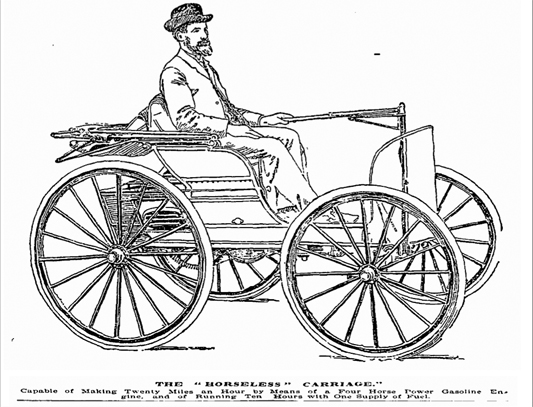Close followers may have picked up on the fact that I don’t like the term “citizen journalism.” Yesterday professional mind blower Henry Jenkins put it in perfect terms for me. (Update: Amy Gahran called this in 2006. I’m just late to the game).
On background from me.
- Henry Jenkins is now the third in my “Professional Mindblower series” I only wish I had video of his talk.
- My take on The Rhetoric of Journalism.
- Stop Gawking at Citizen Journalism.
Henry Jenkins said the term “citizen journalism” is as useless as the term “horseless carriage” which was often used to describe cars when they were still a new phenomena.

It makes perfect sense that this is how we described automobiles at the time. Our culture was so fixated on the horse for transportation that when we found something that got us from place A to place B, we had to define it as something that did a horses’ job – without the horse. The “horseless carriage” term was perfect for that transition phase.
But today if you ask people for 10 facts about automobiles, that they replaced horses probably won’t be on the list. People don’t define cars by what they aren’t or what they replaced over 100 years ago.
I have been using the term “participatory journalism” but many years from now I have a hunch people will just call it “journalism” (what a crazy term, huh) and that will be just fine by me.
Related question: what tools do we need for citizens to do journalism better?
Couldn’t agree more. And yes @Daniel –
We need one of these http://www.crunchbase.com/ but instead of for tech, we need it for Earth.
Workin’ on it.
😉
@cody @Daniel
For tools – I think we need better tools for collaboration like Publish2. Also check Ryan Sholin’s latest blog post.
@Cody: I think we need a crunchbase that is following all the various media/journalism startups that are happening. For all the lip service we give the idea of experimentation and then learning from it (I’m guilty of that too) we have no way of actually keeping track of how they all do.
@Dave
I couldn’t agree more about a mediacrunchbase. There’s mediabistro but unless it’s just not on our radar, I’m really surprised something like this doesn’t exist yet. I’m sending you an email.
do you guys think a collaborative code of practice, like an open-source/wiki-type set of online journalism principles (thou shalt not slander and lie or be paid for comment, etc) would help to bump it’s credibilty and move it away from such qualifiers as ‘participatory’? is there something like this already out there?
@Ryan I think an open standard/ code of conduct for journalism would be very interesting, especially if the qualifiers were somewhat objective. Pat Thornton had an idea for an online ethics seal that seems to be very similar to what you’re describing.
Thanks Daniel,
I think the key to objectivity is getting as many contributing to the proposal as possible, so that all views have the potential to be merited – as with any large-scale participatory venture. A seal like that would be a great way of ‘officialising’ peer review. And I expect that a project like this could feed into ranking systems such as that used by BrooWaha – especially the rating categories.
Thanks very much for the lead. This is pretty much what I’d like to set up in Australia.